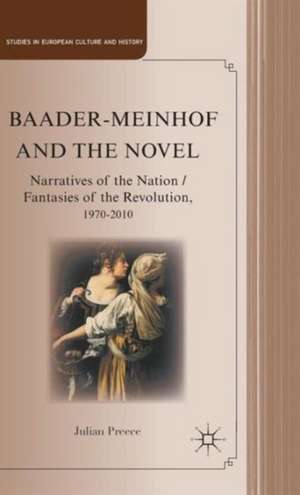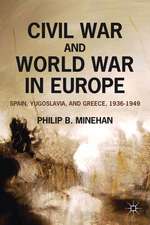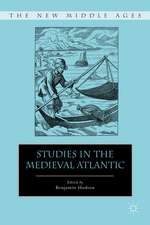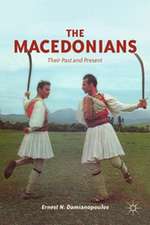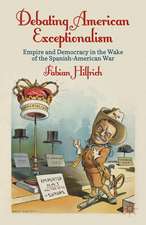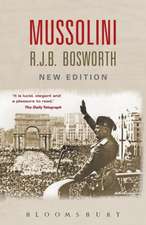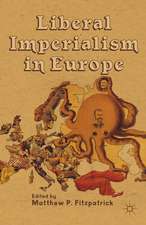Baader-Meinhof and the Novel: Narratives of the Nation / Fantasies of the Revolution, 1970–2010: Studies in European Culture and History
Autor J. Preeceen Limba Engleză Hardback – 24 apr 2012
| Toate formatele și edițiile | Preț | Express |
|---|---|---|
| Paperback (1) | 382.57 lei 6-8 săpt. | |
| Palgrave Macmillan US – 24 apr 2012 | 382.57 lei 6-8 săpt. | |
| Hardback (1) | 388.13 lei 6-8 săpt. | |
| Palgrave Macmillan US – 24 apr 2012 | 388.13 lei 6-8 săpt. |
Din seria Studies in European Culture and History
-
 Preț: 310.99 lei
Preț: 310.99 lei -
 Preț: 383.93 lei
Preț: 383.93 lei -
 Preț: 389.70 lei
Preț: 389.70 lei -
 Preț: 386.00 lei
Preț: 386.00 lei -
 Preț: 393.52 lei
Preț: 393.52 lei -
 Preț: 381.00 lei
Preț: 381.00 lei - 15%
 Preț: 698.15 lei
Preț: 698.15 lei -
 Preț: 389.88 lei
Preț: 389.88 lei -
 Preț: 390.63 lei
Preț: 390.63 lei -
 Preț: 385.84 lei
Preț: 385.84 lei -
 Preț: 384.86 lei
Preț: 384.86 lei -
 Preț: 381.00 lei
Preț: 381.00 lei -
 Preț: 388.72 lei
Preț: 388.72 lei -
 Preț: 381.59 lei
Preț: 381.59 lei -
 Preț: 384.86 lei
Preț: 384.86 lei -
 Preț: 385.84 lei
Preț: 385.84 lei -
 Preț: 388.13 lei
Preț: 388.13 lei -
 Preț: 393.52 lei
Preț: 393.52 lei -
 Preț: 385.84 lei
Preț: 385.84 lei -
 Preț: 387.38 lei
Preț: 387.38 lei -
 Preț: 392.60 lei
Preț: 392.60 lei -
 Preț: 389.11 lei
Preț: 389.11 lei - 15%
 Preț: 638.89 lei
Preț: 638.89 lei - 15%
 Preț: 640.06 lei
Preț: 640.06 lei - 15%
 Preț: 697.32 lei
Preț: 697.32 lei -
 Preț: 384.86 lei
Preț: 384.86 lei -
 Preț: 389.49 lei
Preț: 389.49 lei -
 Preț: 388.90 lei
Preț: 388.90 lei -
 Preț: 388.72 lei
Preț: 388.72 lei - 15%
 Preț: 643.34 lei
Preț: 643.34 lei -
 Preț: 384.86 lei
Preț: 384.86 lei -
 Preț: 388.13 lei
Preț: 388.13 lei -
 Preț: 388.34 lei
Preț: 388.34 lei -
 Preț: 388.72 lei
Preț: 388.72 lei
Preț: 388.13 lei
Nou
Puncte Express: 582
Preț estimativ în valută:
74.27€ • 77.54$ • 61.47£
74.27€ • 77.54$ • 61.47£
Carte tipărită la comandă
Livrare economică 04-18 aprilie
Preluare comenzi: 021 569.72.76
Specificații
ISBN-13: 9780230341074
ISBN-10: 0230341071
Pagini: 214
Ilustrații: XXVI, 214 p.
Dimensiuni: 140 x 216 x 20 mm
Greutate: 0.42 kg
Ediția:2012
Editura: Palgrave Macmillan US
Colecția Palgrave Macmillan
Seria Studies in European Culture and History
Locul publicării:New York, United States
ISBN-10: 0230341071
Pagini: 214
Ilustrații: XXVI, 214 p.
Dimensiuni: 140 x 216 x 20 mm
Greutate: 0.42 kg
Ediția:2012
Editura: Palgrave Macmillan US
Colecția Palgrave Macmillan
Seria Studies in European Culture and History
Locul publicării:New York, United States
Cuprins
Acknowledgements Abbreviations and Specialist Terms A Note on Translation and Citation Preface A Brief History Introduction: The Baader-Meinhof Myth Machine 1. Avoiding the Subject: Six Tropes in Sixty-Eighter Fiction 2. From Stechlin to Stammheim: F.C. Delius as Pioneer 3. Re-Telling the Classics: Baader-Meinhof and the German Literary Canon 4. Terrorism and the Popular Imaginary: Conspiracies and Counterfactuals 5. Baader-Meinhof Translated: From Die Hard to al Qaeda 6. RAF Revivalism in the 2000s Conclusions Bibliography Index
Recenzii
"Preece, in this powerful and lucid study, examines the subsequent history of the [Baader-Meinhof] myth, with particular reference to German literature ... The book examines around fifty German and a smaller number of international novels, as well as feature films and documentaries, and benefits from the sharpness of academic focus this methodology allows; but Preece is also highly alert to the wider context of socio-cultural history and mytholody in which his study is set." - New Welsh Review
"Preece's work will no doubt be vital not only for future studies of the Red Army Faction and the cultural legacy of urban guerrilla violence, but for all those seeking to understand how late capitalism can take its most dangerous enemies and eventually turn them into marketable products." - Critical Quarterly
"Required reading for scholars and students interested in German history, literature, and cultural memory. It offers new insights into the complex link between German mentality and trauma and makes a compelling case for the enduring emotional, social, and manipulative power of literature." - Ingo Cornils, senior lecturer in German, University of Leeds, UK
"A timely and major contribution to the growing range of scholarly books dealing with the Red Army Faction (RAF) and its post-unification legacy. . . This is an accessible, insightful and wide-ranging study that will prove a useful tool for academics, students and a wider readership interested inrepresentations of the Baader?Meinhof group. Its scope and interdisciplinary engagement will no doubt make it a key reference text for Germanists, literature scholars and more general readers interested in the cultural impact of the Baader?Meinhof generation of terrorists." - Journal of European Studies
"Preece has written a fascinating account of Germany's past and present struggle to narrativize Baader-Meinhof: is this history or myth, an inspiration or a warning, a story of victims or perpetrators? From a non-German perspective, are Germany's terrorists the only 'good Germans?' From Katharina Blum to the contemporary Krimi, Preece engages with contradictory fictions in their historical context, giving us a history of the Baader-Meinhof novel that is simultaneously an insight into post-'68 Germany." - Sarah Colvin, Director of the Institute for German Studies, University of Birmingham, UK
"This book is both compelling and illuminating as it revisits the complex multilayered narratives of Germany's trauma. Most importantly it presents a new theoretical reading of how intellectual violence becomes real." - Andrew Hussey, Dean, University of London Institute in Paris, France
"Preece is shrewd in his assessment of the political and intellectual vacuum at the heart of Baader-Meinhof." - Ian Brunskill, Times Literary Supplement
"Preece's work will no doubt be vital not only for future studies of the Red Army Faction and the cultural legacy of urban guerrilla violence, but for all those seeking to understand how late capitalism can take its most dangerous enemies and eventually turn them into marketable products." - Critical Quarterly
"Required reading for scholars and students interested in German history, literature, and cultural memory. It offers new insights into the complex link between German mentality and trauma and makes a compelling case for the enduring emotional, social, and manipulative power of literature." - Ingo Cornils, senior lecturer in German, University of Leeds, UK
"A timely and major contribution to the growing range of scholarly books dealing with the Red Army Faction (RAF) and its post-unification legacy. . . This is an accessible, insightful and wide-ranging study that will prove a useful tool for academics, students and a wider readership interested inrepresentations of the Baader?Meinhof group. Its scope and interdisciplinary engagement will no doubt make it a key reference text for Germanists, literature scholars and more general readers interested in the cultural impact of the Baader?Meinhof generation of terrorists." - Journal of European Studies
"Preece has written a fascinating account of Germany's past and present struggle to narrativize Baader-Meinhof: is this history or myth, an inspiration or a warning, a story of victims or perpetrators? From a non-German perspective, are Germany's terrorists the only 'good Germans?' From Katharina Blum to the contemporary Krimi, Preece engages with contradictory fictions in their historical context, giving us a history of the Baader-Meinhof novel that is simultaneously an insight into post-'68 Germany." - Sarah Colvin, Director of the Institute for German Studies, University of Birmingham, UK
"This book is both compelling and illuminating as it revisits the complex multilayered narratives of Germany's trauma. Most importantly it presents a new theoretical reading of how intellectual violence becomes real." - Andrew Hussey, Dean, University of London Institute in Paris, France
"Preece is shrewd in his assessment of the political and intellectual vacuum at the heart of Baader-Meinhof." - Ian Brunskill, Times Literary Supplement
Notă biografică
JULIAN PREECE is a Professor of German Studies at Swansea University and Director of its Research Centre into Contemporary German Culture. He is the author (with Waldemar Lotnik) of Nine Lives: Ethnic Conflict in the Polish-Ukrainian Borderlands (1999), The Life and Work of Günter Grass: Literature, History, Politics (2001), and Out of the Shadows of a Husband: The Rediscovered Writings of Veza Canetti (2007).
